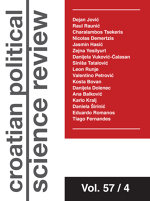The Genesis of the Idea and Value of Political Peace in Early Modern Political Philosophy
The Genesis of the Idea and Value of Political Peace in Early Modern Political Philosophy
Author(s): Raul RaunićSubject(s): Political Philosophy, Early Modern Philosophy, History and theory of political science, Studies in violence and power, Peace and Conflict Studies
Published by: Fakultet političkih znanosti u Zagrebu
Keywords: Violence and War; Political Peace; Aurelius Augustine; Marsilius of Padua; William of Ockham;
Summary/Abstract: The main intention of this paper is to reconstruct the conceptual and historical genesis of the idea and value of political peace from the point of view of political philosophy at the intersection between late scholasticism and early modernity. The paper consists of three related parts. The first part highlights methodological and contextual reasons why the idea of political peace has been overshadowed throughout history by dominant discourses on war. The second part deals with conceptual clarifications. The nature of war is distinguished from other types of conflict and three interpretative approaches to war are analyzed: political realism, fundamentalist-moralistic view of the holy war, and the many theories of natural law that give rise to conceptions of just war, but also the first abolitionist perspective or idea of ending all wars. Early theoretical articulations of the notion of peace indicated modern-day emancipation of politics from the tutelage of metaphysics and classical ethics, thus separating the value of political peace from its original oneness with cosmic and psychological peace. The third part of the paper highlights key moments in the historical genesis of the value of political peace in the works of Aurelius Augustine, Marsilius of Padua, and William of Ockham.
Journal: Politička Misao
- Issue Year: LVII/2020
- Issue No: 04
- Page Range: 33-59
- Page Count: 27
- Language: English

